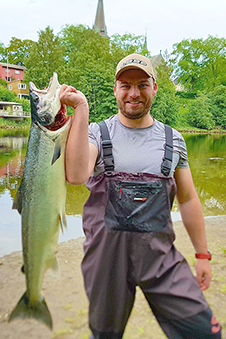 Jacob Lamb catching salmon in the river next to the Norwegian University of Science and Technology.
Jacob Lamb catching salmon in the river next to the Norwegian University of Science and Technology.
Jacob Lamb is passionate about using biology, and his background in biochemistry, to help us use energy in a better way.
Jacob is a scientist in the sustainable energy storage group at the Norwegian University of Science and Technology. In his research, he looks at how to adapt biological processes and materials for our everyday energy use.
As the global environmental crisis grows, the demand for electric cars is rising fast, and alongside it, the demand for lithium-ion batteries. These batteries help relieve our dependence on fossil fuels but come with their own environmental issues.
One massive problem is recycling the components of old batteries. In particular, a part inside the battery called a binder is made of materials that are expensive, can only be prepared using toxic and environmentally unfriendly solvents, and are not easily disposed of.
With his background in biochemistry, Jacob is able to look for nature-inspired solutions to help fix the battery binder issue.
He is developing a battery binder using a biological compound from wood called lignin. Lignin could be made into cheaper and more easily disposable binders, significantly reducing the use of toxic and harmful compounds when making batteries.
Jacob has always had a deep curiosity for how biology works. But back when he started university, his career path was not obvious. At university, biology is divided up into many, many subdisciplines: botany, microbiology, zoology, anatomy, physiology, to name just a few. So what to major in?
Like many students at Otago University, he took the first year health science course which provided a 'taster' across a variety of different disciplines. That is where he was introduced to the subject that underlies all of biology: biochemistry, the study of the molecular building blocks that make up all living things.
Jacob was particularly drawn to learning about photosynthesis, the process where plants, algae and cyanobacteria use energy from sunlight to make food for them to survive.
He says, “Having an interest in the sustainability of our energy future, I was curious to find if there were possibilities for using photosynthetic organisms to produce electricity. A sort of biological solar cell.”
After finishing his BSc majoring in biochemistry, Jacob went on to do a Masters degree researching photosynthesis in cyanobacteria.
“This is where I feel I thrived during my time at Otago. Having ownership of a research project and having time to really immerse myself in the research was an amazing experience that has led me to where I am today.”
Further research into photosynthesis led to a postdoctoral position developing optical sensors for biogas production (another biological energy production method), and from there Jacob has branched out into other areas of energy research, including the study of sensor technologies and process digitalisation for a variety of applications in biological and engineering fields related to energy.
“By focusing on the adaptation of biological processes, materials and technologies, it will be possible to have a truly revolutionary change in our energy economy, significantly reducing our burden on the environment.”
